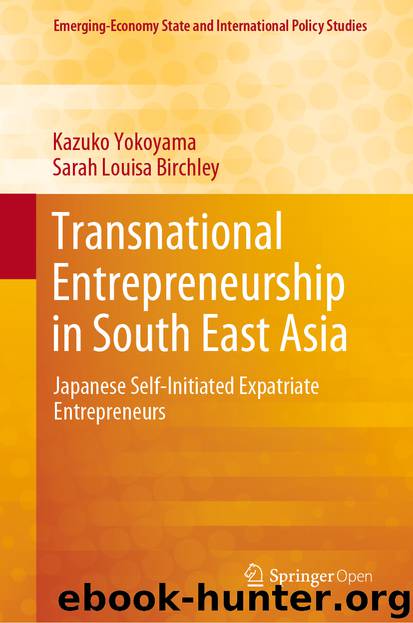Transnational Entrepreneurship in South East Asia by Kazuko Yokoyama & Sarah Louisa Birchley

Author:Kazuko Yokoyama & Sarah Louisa Birchley
Language: eng
Format: epub
ISBN: 9789813292529
Publisher: Springer Singapore
Eventually, the head office was closed in Vietnam and as a result, he was transferred to Indonesia to start new businesses and explore new ventures for the same company. He was put in charge of importing seafood to Japan. He was asked to return to Japan in 2014, but he was already starting to think about starting his own company. As a result, he resigned and started a ramen business which failed, so at the age of 28 in 2014, with a friend, he started selling frozen fish products to restaurants and began importing and exporting fish with a company he called P.T. AJI TAMA. At the time, there were no fishmongers in Surabaya, so he saw a niche in the market and took advantage of it. He now has a fishmonger in Jakarta at the request of Daisei group and has built his network around the region. Specifically, he sells fish for use in Japanese cuisine, so knows the standards expected of the industry. In 2018, he will reach the 5-year anniversary of his business. Case IND-7 currently, distributes to 25 restaurants, has 2 regular Indonesian staff, recruiting additional local part-time employees depending on the season. He is able to speak Indonesian which helps in communication with staff. His mentors are his friends whom he considers to be akin to family. He also has networks with fishermen and factory employees, his business partners in Surabaya and shop owners. At present he is unsatisfied with his work, although he is highly satisfied with his personal life. He is single; he doesn’t need much money, so he saves a little every month to pay back his university fees, but worries that as he has had little work experience in Japan. His guiding philosophy is the idea that he himself knows he is content at the moment and he shouldn’t expect too much. An additional concern is that in order to do the business successfully, he sometimes accepts too much work without fully considering his capacity; therefore he needs to better manage his workload and expectations. He doesn’t know what he will be doing in the future (Table 3.34).Table 3.34Case IND-7 career path
Download
This site does not store any files on its server. We only index and link to content provided by other sites. Please contact the content providers to delete copyright contents if any and email us, we'll remove relevant links or contents immediately.
International Integration of the Brazilian Economy by Elias C. Grivoyannis(107405)
The Radium Girls by Kate Moore(12009)
Turbulence by E. J. Noyes(8014)
Nudge - Improving Decisions about Health, Wealth, and Happiness by Thaler Sunstein(7687)
The Black Swan by Nassim Nicholas Taleb(7097)
Rich Dad Poor Dad by Robert T. Kiyosaki(6590)
Pioneering Portfolio Management by David F. Swensen(6278)
Man-made Catastrophes and Risk Information Concealment by Dmitry Chernov & Didier Sornette(5993)
Zero to One by Peter Thiel(5778)
Secrecy World by Jake Bernstein(4735)
Millionaire: The Philanderer, Gambler, and Duelist Who Invented Modern Finance by Janet Gleeson(4456)
The Age of Surveillance Capitalism by Shoshana Zuboff(4272)
Skin in the Game by Nassim Nicholas Taleb(4231)
The Money Culture by Michael Lewis(4182)
Bullshit Jobs by David Graeber(4173)
Skin in the Game: Hidden Asymmetries in Daily Life by Nassim Nicholas Taleb(3985)
The Dhandho Investor by Mohnish Pabrai(3747)
The Wisdom of Finance by Mihir Desai(3724)
Blockchain Basics by Daniel Drescher(3571)
